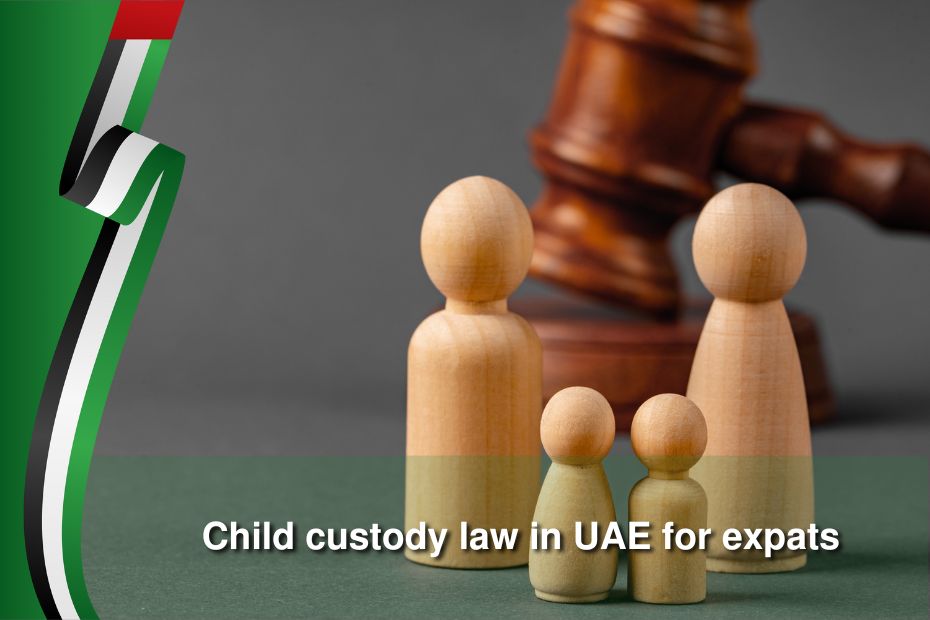This article provides an in-depth overview of child custody law in UAE for expats.
It explores the key provisions under the UAE’s Federal Decree-Laws of 2022 and 2024, which apply to non-Muslim foreigners living in the UAE.
Understanding these laws is essential for expatriates going through divorce or custody disputes in the UAE in 2025, as they govern how custody matters are handled.
Contact our expert lawyers & legal consultants in UAE. Click the WhatsApp icon below.
Table of Contents
Child Custody Law in UAE for Expats
The child custody laws in the UAE are detailed and specific. They ensure the well-being of children involved in custody disputes while balancing the rights and responsibilities of both parents.
As an expat in the UAE, it is important to understand how the Federal Decree-Laws of 2022 and 2024 apply to your situation, as these laws impact divorce, custody, and alimony issues.
Civil Personal Status Child Custody
Federal Decree-Law No. (41) of 2022 on the Civil Personal Status applies to non-Muslim foreigners in the UAE unless they choose to apply their home country’s laws.
Additionally, those governed by this law may agree to apply other family or personal status legislation in the UAE instead.
Key highlights include:
- Joint Custody: Both parents have an equal right to assume joint custody of their children until the child reaches 18 years old. If there is any dispute over custody, either parent may request the court’s intervention.
- Custody of Children: This law stipulates that custody should be shared between the parents after a divorce, and both have the responsibility to raise and care for the child. Custody may be modified if either parent is deemed unfit or there is a significant change in circumstances. If one parent is not fulfilling their duties, the other parent can request the court to remove them from joint custody.
- Alimony: The father is responsible for alimony for the mother during the period of joint custody. Alimony ceases if the mother remarries or if she loses custody of the child.
- Disputes: In case of disputes between parents regarding custody or child-related matters, the court has the discretionary power to decide what is in the best interest of the child.
Personal Status Law Custody
Federal Decree-Law No. (41) of 2024 (Personal Status Law) applies to non-UAE citizens unless they apply their law or another agreed-upon law, as permitted by the UAE’s legislation.
Notable provisions are:
- Custody and Guardianship: The law outlines the right of parents to custody, stating that custody is the mother’s right if the child is under two years of age. The father has custody rights if the child is older unless the court rules otherwise.
- Conditions for Custodians: The custodian must be mentally sound, capable of caring for the child, and free from any diseases that could harm the child. If the custodian is a woman, she must not be married to a man unrelated to the child unless the court deems it in the child’s best interest.
- Right to Choose: A child above the age of 15 may choose which parent they wish to live with, as long as it is in the child’s best interest.
- Termination of Custody: Custody is terminated when the child reaches the age of 18, or earlier if the child is incapacitated or requires special care.
- Visitation Rights: The parent not awarded custody has the right to visit the child. If disputes arise over visitation, the court will determine what is in the best interest of the child.
Legal Services Related to Child Custody Law in UAE Expats
Our law firm in UAE specializes in providing legal services tailored to expatriates navigating child custody issues in the UAE.
Our team of expert lawyers offers clients comprehensive support through all custody process stages. Our legal services include:
- Custody Dispute Resolution: We help resolve disputes between parents regarding joint or sole custody, ensuring that the child’s best interests are always prioritized. We represent our clients in court, advocating for fair and just outcomes.
- Child Custody Modification: If circumstances change after a custody decision is made, we assist in petitioning the court to modify the custody arrangement, whether due to a parent’s unfitness, relocation, or other significant factors.
- Alimony and Child Support: Our legal experts provide guidance on matters related to child support and alimony. We assist in determining fair financial arrangements during joint custody or post-divorce.
- Visitation Rights: We help ensure that the non-custodial parent’s visitation rights are protected, helping to establish or modify visitation agreements in the best interest of the child.
- International Custody and Relocation: If you need to relocate with your child, we offer advice and legal assistance regarding international custody matters, ensuring you meet the legal requirements for relocating out of the UAE with your child.
- Custody Agreements and Settlements: We assist in drafting clear and enforceable custody agreements that are in line with the child custody law in UAE for expats, ensuring that both parties understand their rights and obligations.
Learn about the Best Family Lawyer in Dubai and read about the top Family Lawyers for Child Custody in UAE.
FAQs about UAE Child Custody Laws for Expatriates
Conclusion.
Understanding child custody law in UAE for expats is crucial for expatriates who are involved in custody disputes.
Both Federal Decree-Laws of 2022 and 2024 provide a framework for ensuring that children’s interests are prioritized in custody decisions.
For expatriates seeking legal advice or assistance with custody matters, our law firm offers specialized legal services that ensure the best possible outcomes in child custody cases.
Contact our law firm in UAE for expert help. Click the Whatsapp icon below.
Omar Al Mansoori is an Emirati legal advisor and researcher with over 10 years of experience in civil, commercial, and corporate law in the UAE. He focuses on simplifying complex legal topics and ensuring that every article published aligns with the latest national legislation and official regulations.
